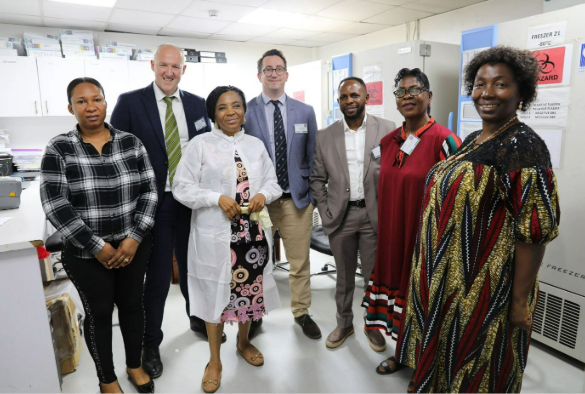Dr Steve Aston, Senior Clinical Lecturer in Infectious Diseases at the Institute of Systems, Molecular and Integrative Biology, and Lead Mentor for the Fleming Fund Fellowship, recently travelled with colleagues to Nigeria for the orientation workshop for the Phase II Fellows.
I recently travelled with colleagues from the University of Liverpool, City and St George’s University, and Worldfish to Abuja, Nigeria, to host the in-person orientation meeting for the Fleming Fund Fellowship programme.
The University of Liverpool is the host institution for the Fleming Fund Fellowship (FFF) programme for Fellows from Nigeria and Sierra Leone. The FFF programme is a UK Government initiative designed to support the professional development of antimicrobial resistance (AMR) practitioners and influencers to boost AMR workforce capacity around the world.
I am very proud to be the lead mentor for this programme at Liverpool, where we mentor some incredibly talented fellows from both Nigeria and Sierra Leone. This fellowship scheme, though, is much more than just a training programme. It’s a platform for innovation, knowledge exchange, and leadership development.
The meeting in Abuja was our first opportunity to meet in person our Fellows from Nigeria. They are a group of dedicated professionals from across human, animal, environmental and aquaculture health sectors, all united in their efforts to address AMR.
Alongside our Fellows, we had the pleasure of meeting key figures in Nigeria’s AMR response including senior leaders from the Nigeria Center for Disease Control and the Federal Ministries of Agriculture and Environment, as well as other Fleming Fund grantees. Our conversations helped to align our efforts to improve AMR data collection and use.
During the three-day orientation programme we had valuable discussions around the importance of AMR data, not just for research, but for driving policies that have tangible impacts on public health in Nigeria. I led several sessions that aimed to support the Fellows through the process of building their workplans for the fellowship. We focused on identifying learning opportunities to build core skills and developing innovations addressing practical challenges in AMR surveillance to enhance our Fellows ability to generate, analyse and use high-quality AMR data in their respective institutions.
Throughout we encouraged our Fellows to adopt a One Health approach, a key component of the Fleming Fund programme, highlighting the need for strong linkages between human, animal, environment and aquaculture health to tackle AMR comprehensively.
I was particularly inspired by the Fellows’ passion for making a difference in their communities and across Nigeria. Their drive to improve AMR surveillance, enhance data use, and strengthen healthcare systems aligns with our core values of inclusivity, collaboration, and civic responsibility at Liverpool. Through supporting our Fellows – many already established as leaders in their respective fields – we are strengthening capacity and laying the foundation for a healthier future for all.
I am excited to continue working with our Nigerian colleagues as part of the global effort to develop solutions to AMR – one of the most significant public health challenges of our time. Next stop, Sierra Leone!
Photo: Steve Aston (far left) is pictured with Fellows and Mentors on a tour of the Bacteriology Laboratory, National Reference Laboratory, Gaduwa.
